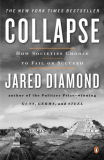










 |
 |
 |
 |
 |
 |
||
 |
 |
 |
 |
 |
ecologically
collapsing and retrenching civilisations
|
|||||
|
|
|
||||
| ecologically
collapsing and retrenching civilisations: written sources is part of a series of briefing documents on housing and
making living systems ecological. This grouping is contained within a set of documents on global concerns at abelard.org. |
|||||
ecological
collapse
|
|||||||||||||||||||
| Collapse (How Societies Choose to Fail or Succeed) by Jared Diamond |
||
 |
Penguin Group USA Inc, 2004, hbk
Penguin Books, 2011, pbk,
|
kindle Penguin, 2013 audio cd Penguin Group USA, 2004
|
For some balance on population scaremongering, see Peoplequake by Fred Pearce ![]() .
.
![]()
![]()
![]()
 |
When
a billion Chinese jump: how China will save mankind—or
destroy it Scribner, original edition, 26 October 2010 |
 |
I would recommend this book as an introductory reader for any relevant studies, as well as being very useful background for those trying to keep abreast of a rapidly changing modern world. For a more extensive review.
|
|
| [the GoldenYak rating would be substantially higher, but for the criticisms noted below.] | |
 |
$11.20 (amazon.com) Reprint edition (April 1993), Penguin USA , 0140176608 pbk |
| £10.13 (amazon.co.uk) Reprint edition (April 1993), Penguin, 0140176608 pbk |
|
This book endlessly catalogues the despoliation of planetary resources in a wide range of areas of history, activities and geography.
At times it goes over the top, as is common with material coming out of the evangelising green lobby. This can undermine the message at times, when the political agenda tends to overwhelm the real on the ground facts, or when the author is carried away with the shallow ‘capitalism bad’ mantra.
There are very real problems with population and resource pressures. It does no good to exaggerate these problems, as that makes them too easy to be dismissed by those who would rather not face the problems, but instead hope to carry on with ‘business as usual’.
The book is now a dozen years out of date, which is a very long time in this growing field. It could very much do with an update. However, the wide ranging history covered, its application to the rise and fall of civilisations and its dire warning for the future, make this a resource of considerable value.
This book should form part of any modern civics curriculum, but should be read and used with caution.
 The
end of the line by Charles Clover, Ebury
Press, 2004, hbk, 0091897807, £8.99 [amazon.co.uk] {advert}
The
end of the line by Charles Clover, Ebury
Press, 2004, hbk, 0091897807, £8.99 [amazon.co.uk] {advert} ![]()
For the current state of the fishing industry and fisheries, The end of the line is much better than either
of the books discussed above. Recommended basic reading
on this subject.
.rtf
version (requires MS Word or similar)
google
cache html (not so pretty, but also not so MS dependant)
Civilizations Fall: A Theory of Catabolic Collapse is probably worth a quick scan, despite being over-loaded by redundant jargon. The item compares catastrophically collapsing civilisations with those adjusting to a lesser but more stable lifestyle through varying accidents.
“These parallel differences between R-selected and K-selected nonhuman species. A society that maximizes its production of capital, like an R-selected species, prospers in an environment with substantial uncaptured resources but falters once these are exhausted. Its successors are likely to be societies that, like K-selected species, use key resources more sustainably at the cost of decreased production of capital. Nonhuman climax communities also typically display a higher diversity of species, but a lower population per species, than earlier seral stages, and produce notably lower volumes of biomass per unit time (Odum 1969).
“Broadly similar changes often distinguish precollapse and postcollapse societies. Thus the collapse of the western Roman Empire, for example, could be seen as a succession process in which one seral stage, dominated by a single sociopolitical "species" that maximized capital production at the cost of inefficiency, was replaced by a more diverse community of societies, consisting of many less populous "species" better adapted to their own local conditions, and producing capital at lower but more sustainable rates. [...] ”
‘Seral’ or ‘seres’ is really
just another word for ‘stage’: a presumed
arrangement.![]()
 |
by Joseph Tainter, Colin Renfrew, first published 1988 Cambridge University Press, reprinted 1990, 052138673X |
The authors appear to take an information-theoretic approach to social collapse. This looks either trivial or unconvincing or irrelevant in the context of the ecological collapse, but you may wish to know about it.
From a review at amazon:
“[...] the "number of challenges with which the Universe can confront a society is, for practical purposes, infinite," complex societies need to keep on increasing their level of complexity in order to survive new challenges. Tainter's thesis is that these "investments in additional complexity" produce fewer and fewer returns with time.
“The hunter-gatheres of the above example incur costs as they try to solve their food-shortage problem. If they conquer their neighbours, they have to garrison those territories, thus raising the cost of government. If they start agriculture on a larger or more intense scale in their own territories, they have to create a new class of citizens to man the farms, distribute and store the grain, and guard it from animals and invaders. In either case, the increases in access to energy (food) are offset somewhat by the increased cost of social complexity.”
related material
conservation
on a personal level

© abelard, 2005,09 march the address for this document is https://www.abelard.org/briefings/civilisations.htm 1500 words words |
| latest | abstracts | briefings | information | headlines | resources | interesting | about abelard | ||